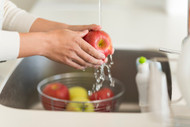Food By The Numbers
Posted by Kenton Jones on Jul 14th 2020
We always stress the importance of proper hydration, and the importance of cleaner, healthier drinking water toward proper hydration. While it would be more difficult to properly hydrate solely from food, there are many foods out there with a high water content – as well as many foods that can dehydrate you. For this Multipure Spotlight article, we are going to take a look at Food By The Numbers.
Water Content of Fruits and Vegetables
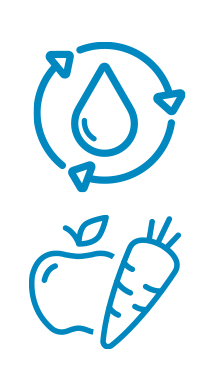
- 96% - Lettuce
- 95% - Bok Choy, Celery, Cucumber, Radish
- 94% - Tomato, Zucchini
- 92% - Bell Pepper, Cabbage, Carrot, Watermelon
- 91% - Broccoli, Grapefruit, Spinach, Strawberry
- 90% - Cantaloupe
- 89% - Peach
- 88% - Blackberry, Nectarine
- 87% - Orange, Pineapple, Plum
Water Content of Prepared Foods
Note that for many prepared foods, water content is offset by the presence of ingredients that can dehydrate, such as sodium and sugar. So, while many broths and soups are primarily water, that hydration is offset by very high levels of sodium.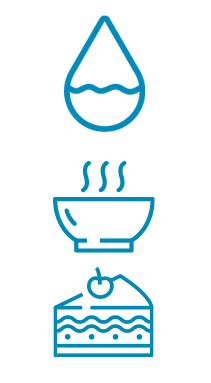
- 92% - broths and soups
- 80-89% - fruit juice, yogurt
- 70-79% - cottage cheese
- 60-69% - pasta
- 50-59% - ground beef, hot dogs, cooked steak
- 40-49% - pizza
- 30-39% - cheddar cheese, bread
- 20-20% - cake, biscuits
- 10-19% - butter, margarine
- 1-9% - nuts, crackers, cereals
- 0% - oils, sugars
Sodium Content of Foods
High levels of sodium dehydrate the body by changing the electrolyte balance in the bloodstream. This causes the kidneys to try to remove excess sodium through urine, which causes increased water loss. The following list shows the amount of sodium (in milligrams) per serving size of various prepared foods, and how that compares to the Recommended Daily Intake (RDI) of the average adult – 2300mg of sodium maximum. When eating many of the following foods, make sure to drink plenty of water with the meal and throughout the day.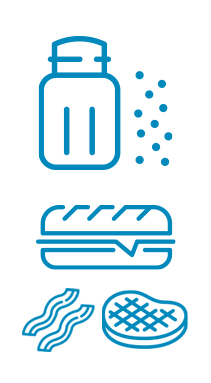
- 1,127mg – 1 6-inch cold cut sub sandwich (49% RDI)
- 1,117mg – 3oz of roast ham (48% RDI)
- 1,024mg – 1oz of soy sauce (44% RDI)
- 957mg – 1 large slice of pizza (41% RDI)
- 700mg – 1 cup of canned soup (30% RDI)
- 620mg – 1oz of beef jerky (27% RDI)
- 578mg – 1 hot dog (25% RDI)
- 475mg – 1 cup macaroni and cheese (20% RDI)
- 405mg – 8oz of vegetable juice (17% RDI)
- 400mg – 1 bagel (17% RDI)
- 350mg – 1/2 cup of cottage cheese (15% RDI)
- 310mg – 1/2 cup of canned peas (13% RDI)
- 304mg – 2 tbsp of salad dressing (13% RDI)
- 241mg – 1oz of dill pickle (10% RDI)
- 233mg – 1oz bacon (10% RDI)
Dehydrating Foods
The following foods contain ingredients that act as diuretics: alcohol, sugar, sugar substitutes, caffeine, and salt (sodium). These cause you to urinate more and dehydrate more quickly. It is best to limit the intake of any of the foods on this list, or at the very least, drink plenty of water in conjunction with their intake.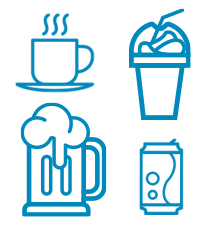
- Alcohol – beer, wine, liquor
- Sugar or Sugar Substitutes – soda, fruit juice, energy drinks
- Caffeine – coffee, soda, energy drinks
- Salt – cured meats, soy sauce, fried foods, salty snacks
The Bottom Line
The bottom line is that nothing beats clean, healthy water for daily hydration. While many foods are high in water content, the best foods for hydration tend to be fresh, unprocessed fruits and vegetables. Generally, the more processed, packaged, and cooked the food is, the less chance it has of serving as proper hydration, and the greater the chance it has of dehydrating you. So stay hydrated, stay healthy, and Taste the Difference of Multipure.

